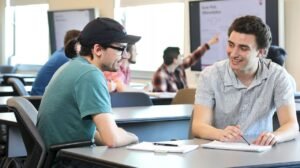The academic calendar is a critical component of any educational institution, serving as the backbone for the scheduling of academic activities throughout the year. This guide delves into the intricacies of the stevens academic calendar, explaining its structure, importance, and how it impacts the educational and social life on campus.
Overview of Stevens Institute of Technology
Stevens Institute of Technology, located in Hoboken, New Jersey, is a renowned private research university. Known for its strong emphasis on engineering, science, and technology, Stevens offers a range of undergraduate and graduate programs that prepare students for careers in high-demand fields. With a history dating back to 1870, Stevens has established itself as a leader in innovation and applied learning.
Structure of the Stevens Academic Calendar
The Stevens Academic Calendar is designed to align with the university’s mission of providing a rigorous and comprehensive education. It is structured around a traditional semester system, with additional summer and winter sessions that offer flexibility for students.
- Fall Semester
- Start and End Dates: The Fall semester typically begins in late August or early September and runs through mid-December.
- Important Dates: Key dates within the Fall semester include the start of classes, add/drop deadlines, midterms, the Thanksgiving break, and final exams. The semester concludes with a final exam period, followed by winter break.
- Spring Semester
- Start and End Dates: The Spring semester usually begins in mid-January and ends in early May.
- Important Dates: Significant dates during the Spring semester include the start of classes, add/drop deadlines, Spring break, midterms, and final exams. The semester concludes with commencement ceremonies in May.
- Summer Sessions
- Structure: The Summer sessions at Stevens are divided into multiple shorter terms, typically referred to as Summer I and Summer II. These sessions allow students to accelerate their studies, retake courses, or explore new subjects.
- Duration: Each summer session lasts approximately six to eight weeks, with courses offered in a condensed format.
- Winter Intersession
- Purpose: The Winter intersession is a brief academic period between the Fall and Spring semesters. It provides an opportunity for students to take intensive courses, often online or in hybrid formats, over a few weeks in January.
- Benefits: This intersession allows students to catch up on credits, explore new areas of study, or lighten their course load for the upcoming semester.

Several key components make up the Stevens Academic Calendar, each serving a specific purpose in the academic year.
- Orientation Week
- Introduction to Campus Life: Before the start of the Fall semester, Stevens hosts an orientation week for incoming students. This week is designed to help new students acclimate to campus life, meet their peers, and familiarize themselves with university resources.
- Add/Drop Period
- Flexibility for Students: The add/drop period is a short window at the beginning of each semester during which students can adjust their course schedules. This period allows students to drop courses they no longer wish to take or add new courses without financial or academic penalties.
- Academic Planning: It’s a critical time for students to finalize their schedules and ensure that they are meeting the requirements for their major and minor programs.
- Midterm Exams
- Assessment Milestone: Midterms are a key component of the academic calendar, providing a midpoint assessment of student progress in each course. These exams are often a significant portion of the final grade and serve as a checkpoint for both students and faculty.
- Preparation Time: The academic calendar typically includes a midterm break or reading days, allowing students to prepare for these exams.
- Breaks and Holidays
- Balancing Academic and Personal Life: The academic calendar includes several breaks and holidays throughout the year, including Thanksgiving break, Spring break, and national holidays.
- Final Exams
- Culmination of the Semester: Final exams are the culminating assessments of the semester, often determining a significant portion of the course grade. The academic calendar designates a specific final exam period at the end of each semester.
- Preparation and Review: The period leading up to final exams often includes review sessions and office hours where students can seek additional help from their professors.
- Commencement
- Celebrating Achievements: The academic calendar concludes with commencement ceremonies, celebrating the achievements of graduating students. This event marks the transition from student life to professional life, with graduates receiving their degrees in front of family and friends.
- Planning for the Future: Commencement also serves as a reminder of the importance of academic planning throughout a student’s time at Stevens, ensuring that all degree requirements have been met.

Impact of the Academic Calendar on Campus Life
- Academic Rigor
- Structured Learning: The calendar’s structure ensures that students experience a consistent and rigorous academic environment. The clear delineation of semesters and breaks allows students to plan their studies effectively, balancing coursework with extracurricular activities.
- Continuous Learning: With the availability of summer sessions and winter intersession, students can engage in continuous learning, making the most of their time at Stevens.
- Social and Extracurricular Activities
- Integration with Campus Life: The academic calendar is closely tied to the schedule of social and extracurricular activities on campus. Clubs, organizations, and sports teams often plan their events around the academic calendar to maximize student participation.
- Balance and Well-being: Breaks and holidays are strategically placed within the academic calendar to promote student well-being, providing time for relaxation and reflection amidst the demands of academic life.
- Career Development
- Internship Opportunities: The academic calendar aligns with the hiring cycles of many industries, allowing students to pursue internships during the summer or winter breaks. These experiences are crucial for career development and often lead to full-time job offers post-graduation.
- Global Programs
- Study Abroad Opportunities: The academic calendar also accommodates study abroad programs, with students typically participating in these experiences during the summer or a specific semester. These programs enhance cultural understanding and global awareness, which are increasingly important in today’s interconnected world.
- International Collaboration: Stevens’ partnerships with institutions around the world are facilitated by the academic calendar, enabling collaborative research and exchange programs that enrich the academic experience.
Adapting to Changes in the Academic Calendar
The Stevens Academic Calendar is periodically reviewed and adjusted to meet the evolving needs of the university community.
- Flexibility in Uncertain Times
- Online and Hybrid Learning: The pandemic highlighted the need for flexibility in the academic calendar, leading to the adoption of online and hybrid learning formats. These changes have had a lasting impact, with Stevens continuing to offer flexible learning options.
- Adapting to New Norms: The ability to adapt the academic calendar to unforeseen circumstances ensures that Stevens remains resilient and responsive to the needs of its students and faculty.
- Planning for the Future
- Innovations in Scheduling: As education continues to evolve, so too will the academic calendar. Future changes may include more flexible scheduling options, expanded online course offerings, and enhanced support for students balancing academics with work or personal commitments.

- Innovations in Scheduling: As education continues to evolve, so too will the academic calendar. Future changes may include more flexible scheduling options, expanded online course offerings, and enhanced support for students balancing academics with work or personal commitments.
Conclusion
The stevens academic calendar is a vital tool that underpins the educational experience at Stevens Institute of Technology. By understanding and utilizing the academic calendar effectively, students can maximize their educational experience, balancing rigorous academics with personal growth and career development. As Stevens continues to innovate and adapt, the academic calendar will remain a cornerstone of the university’s commitment to excellence in education.
For more detailed information about the Stevens Academic Calendar, including specific dates and deadlines, visit the official university website or consult with your academic advisor.

